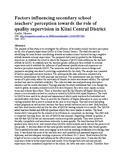| dc.description.abstract | The purpose of this study is to investigate the influence of secondary school teacher's perception on the role of quality supervision QASO in Kitui Central District. The study focused on identifying the main factors contributing towards secondary schooJ teachers having a negative attitude towards external supervision. The proposed study was be guided by the following objectives; to establish the extent to which the frequency QASO visits influences the teachers' attitude to QASO, to establish how the teachers gender influences their attitude to external supervision and to establish the influence of professional qualifications and experience on teachers perception towards QASO. The researcher used descriptive research design and purposive sampling was done by selecting respondents for the study.
The sample size consisted of twelve principals and sixty teachers. The instruments for data collection consisted of a structure questionnaire for both principal and teachers. The questionnaire was pre-tested by means of a pilot study where the university of Nairobi lecturers ascertained validity. The splithalf method was used to establish reliability. The collected data was analyzed using descriptive statistics and the results discussed. Through analysis the study established that, even though the visits to public secondary schools by QASOs were frequent, they were more regular in some terms and schools than others. There is therefore need for the Ministry of Higher Education to ensure every secondary school in country is visited by QASOs with equal frequency. The visits by QASOs were said to be abrupt and unannounced which made teachers feel ambushed and uncomfortable with them.
There is need for the Ministry of Higher Education to come up with a visiting schedule that is sent to schools as the year or term begins. This will avoid disrupting school programs as well as alert teachers that there would visitors on such a date. Both teachers and their head teachers did not like the idea of QASOs visiting schools every month. The QASOs asked teachers foolish and difficult questions which they were unable to answer. The head teaches felt it was good for the schools to be left alone to concentrate on teaching. They felt with a competent teaching force, the role of QASOs was minimal. Regarding attitude on gender, it was felt that QASOs did not discriminate teachers on gender grounds.
They were however friendly, sympathetic and sometimes autocratic to some gender. The head teachers felt both genders were likely to be interviewed when QASOs visited schools and it was not the preserve of one gender. It was also observed that male gender needed more supervision than female gender. This is probably because some men engage in acts such as smoking alcoholism even during class time. It was found that most of the teachers were well qualified and possessed degrees and diplomas, and had adequate working experience of between 10-15 years. Head teachers felt the length of service a teacher had influenced the effectiveness in supervision. It was also felt that experience leads to better supervision and results. Even though both external and internal supervision were considered important to the school, the latter was more critical. Therefore there is needed to come with a policy that streamlines both external and internal supervision so that both are not in conflict. | en_US |

